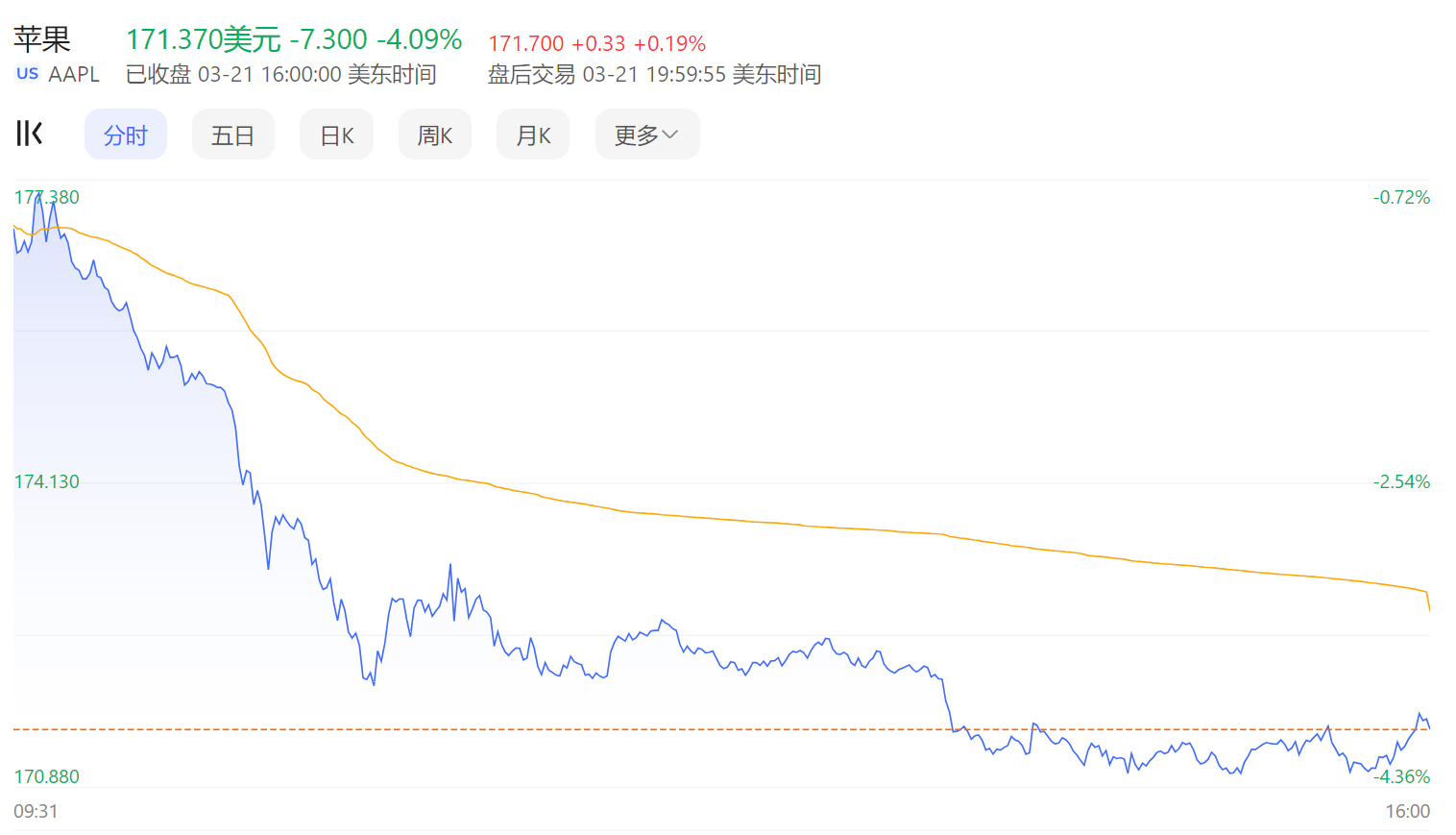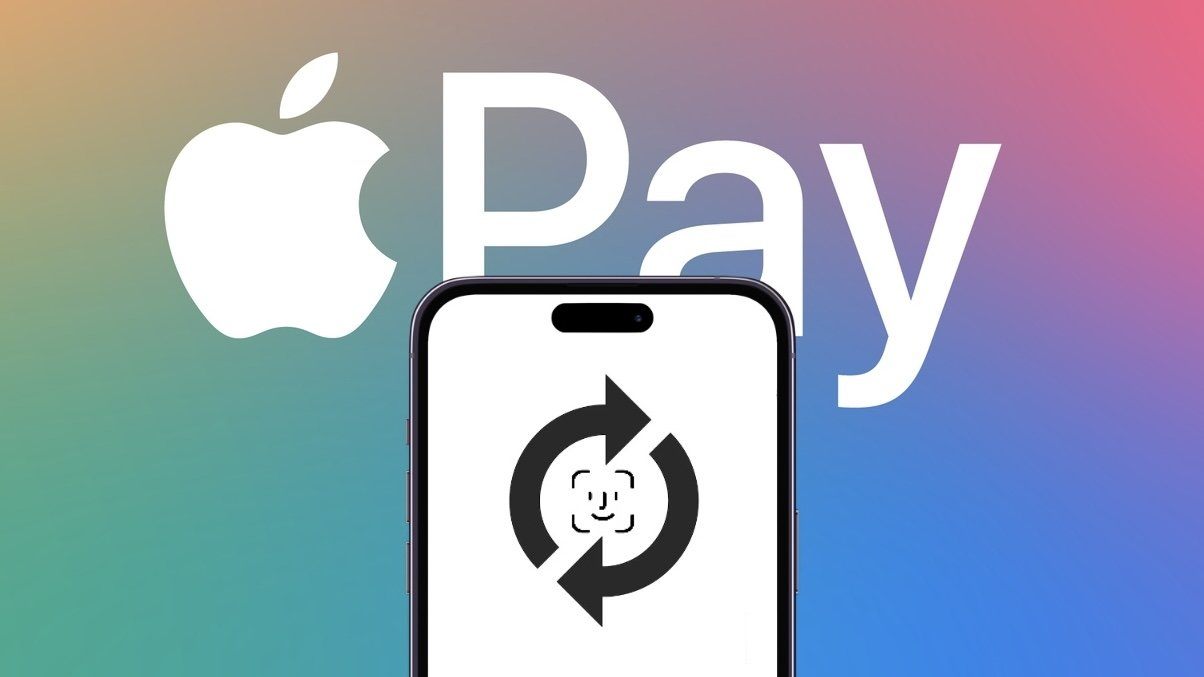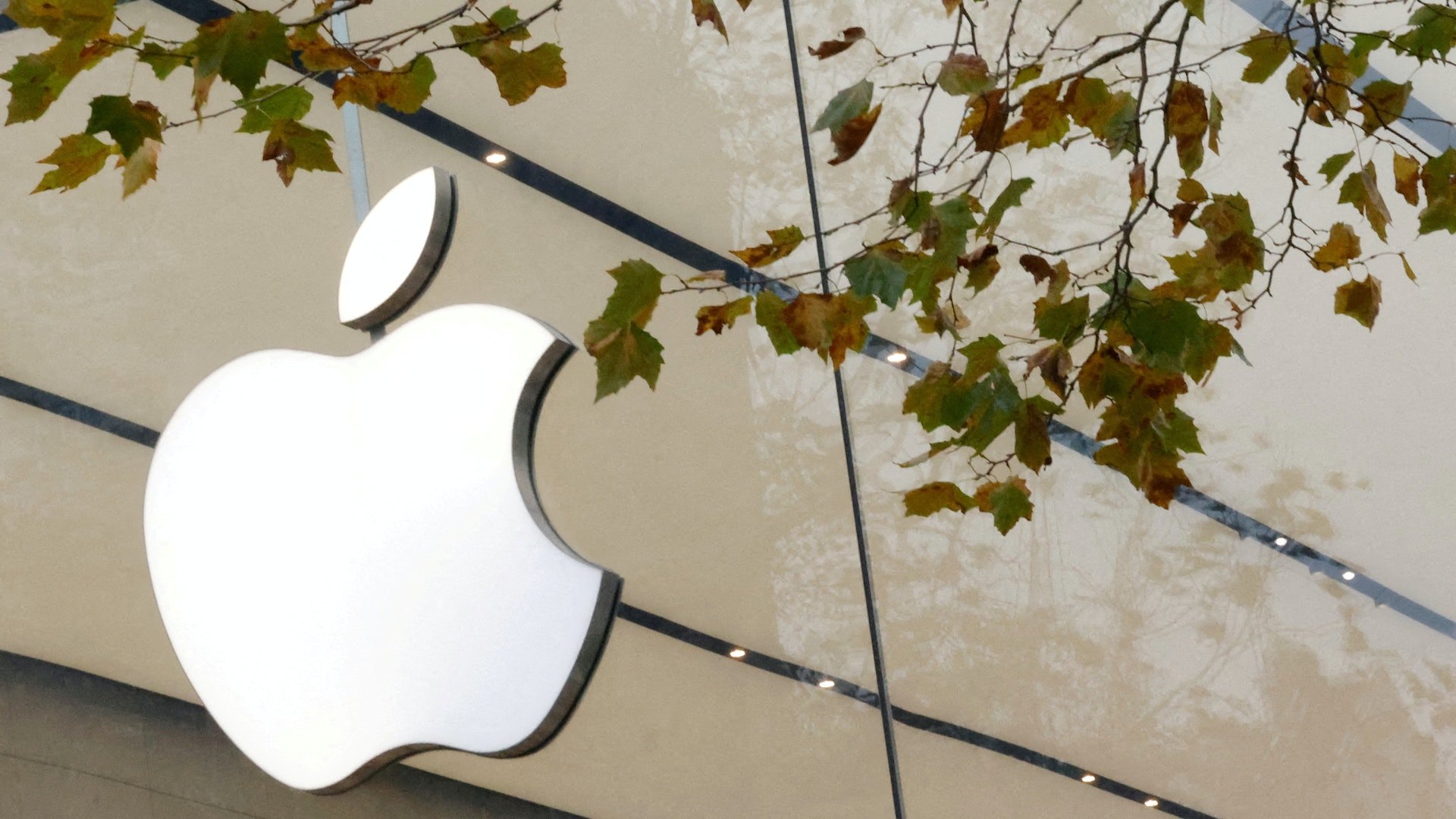Encountered the hammer of antitrust! The US Department of Justice announces formal lawsuit against Apple
On Thursday (March 22) local time, the US Department of Justice, in conjunction with 16 Attorney Generals, announced that they would sue Apple, accusing it of violating antitrust laws, causing Apple's stock price to drop by over 4%.
On Thursday, March 22nd local time, Apple opened low and closed down more than 4% at $171.370, marking the largest daily decline since August 4th last year. Its market value evaporated overnight by $113 billion. Since the beginning of this year, Apple's stock price has fallen by 11%.

Apple shares were hit hard because on the same day, the U.S. Department of Justice, in conjunction with 16 attorneys general, announced that it would sue Apple for antitrust violations.
The U.S. Department of Justice's antitrust "sledgehammer"
The U.S. Department of Justice lawsuit highlights five examples of Apple's technology to suppress competition: superapps, cloud streaming gaming apps, messaging apps, smartwatches, and digital wallets.
Chief among the charges is Apple's attempt to use the "pay" card to build a superapp.
The U.S. Department of Justice, citing estimates from the U.S. Consumer Financial Protection Bureau, said Apple Pay facilitated nearly $200 billion of deals in the U.S. in 2022, and that figure is expected to rise to $458 billion by 2028.Apple currently charges a small fee for any transaction made through Apple Pay.
Although this revenue is not worth mentioning in Apple's total revenue, the Justice Department believes that payments are central to people's survival in today's world, saying, "Apple recognizes that paying for products and services using a digital wallet will eventually become something people do every day."
Moreover, Apple has also banned other companies from building click-to-pay features in third-party mobile wallets, which the U.S. Department of Justice believes hinders the development of the technology."Without Apple's behavior, cross-platform digital wallets could also be used to manage and pay for subscriptions and in-app purchases."
The U.S. Department of Justice said that today, Apple maintains "full control" over the use of NFC in the iPhone for inductive payments by U.S. users, and may therefore build a super application for shopping, digital keys, transportation, travel, entertainment, etc.
The lawsuit also pointed out that Apple's actions have made it more difficult for Americans to switch smartphones. "Apple is also using its smartphone monopoly to prevent these partners from developing better payment products and services for iPhone users."
The US Department of Justice stated that if third-party developers can create cross platform wallets, users transitioning from iPhones can continue to use the same wallet and use the same card, ID, payment history, and other information, making it easier to switch from Apple to other smartphones without worrying about data disappearing.

In addition to Apple Pay, Apple's smartwatches, iMessage, cloud services and many other Apple applications are among the "attacks" of the U.S. Department of Justice on the grounds that they hinder market competition.
Case Western Reserve University antitrust expert and law professor AnatAlon-Beck said the wide-ranging lawsuit "involves Apple's core unfair practices.""Apple systematically excludes competitors from the Apple ecosystem.By doing so, Apple is hurting a lot of startups, stakeholders, customers and, in my opinion, its shareholders."
Apple rebutted the lawsuit in a statement.
At Apple, we innovate every day to create technology that people love - designing products that work together seamlessly, protecting people's privacy and security, and creating magical experiences for our users.This lawsuit threatens our identity and the principles that make Apple products stand out in a highly competitive market."
In addition, Apple believes that if the Justice Department succeeds, "it will set a dangerous precedent for the government to take drastic measures in design."The company said,"We believe this lawsuit is factually and legally wrong and we will vigorously defend against it."
Apple just got an EU ticket this month
In early March, the EU imposed an 1.84 billion euros fine for Apple's breach of antitrust rules in the market for its music streaming service on its mobile platform iOS.
The penalty relates to Apple's app anti-bootstrap clause, which limits the music streaming app's ability to tell consumers about cheaper products outside the Apple App Store.
Apple has its own music streaming service, Apple Music, while rivals such as Spotify argue the restrictions put them at a disadvantage when it comes to competing with iOS and App Store operators.
Spotify announced its lawsuit against Apple in March 2019, claiming that Apple's App Store rules "deliberately limit choice and stifle innovation at the expense of the user experience," and that Apple deliberately put other app developers at a disadvantage, accusing Apple of being both a "player" and a "referee."
After more than four years of trial, the European Commission finally said earlier this month that the restriction was hindering European consumers from making a free choice.
"Apple's rules ultimately hurt consumers," said EU competition chief Margrethe Vestager, adding that "critical information is withheld, making it impossible for consumers to use it effectively or make an informed choice."
Vestager further said,"Some consumers may be paying more because they don't know they can pay less if they subscribe outside the app.And other consumers may simply not be able to subscribe to their favorite music streaming provider because they simply can't find it."
"The committee found that Apple's rules led to the concealment of key information about prices and service features from consumers. Therefore, we consider them unfair trading conditions as they were unilaterally imposed by a dominant company," said Vestager.
The total amount of fines accounts for approximately 0.5% of Apple's global revenue. EU regulators said, "The fine we imposed today reflects both Apple's financial strength and the harm Apple's actions have caused to millions of European users."
Subsequently, Apple stated that it will appeal the decision of the European Union. Apple wrote in a statement, "Apple has been in Europe for over 40 years, and now we provide over 2.5 million jobs to the entire European continent. We help the market thrive, promote competition and innovation in every aspect, and the AppStore is an important part of this story. Therefore, while we respect the European Commission, the facts do not support this decision. Therefore, Apple will appeal."

·Original
Disclaimer: The views in this article are from the original Creator and do not represent the views or position of Hawk Insight. The content of the article is for reference, communication and learning only, and does not constitute investment advice. If it involves copyright issues, please contact us for deletion.